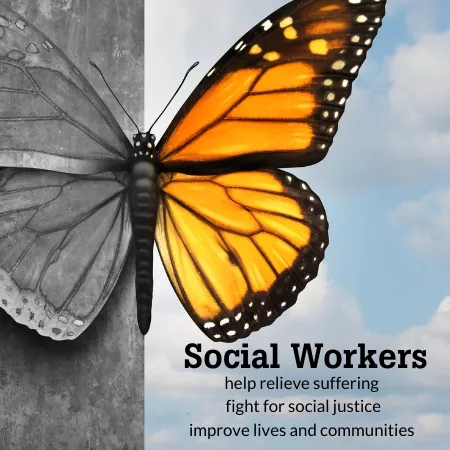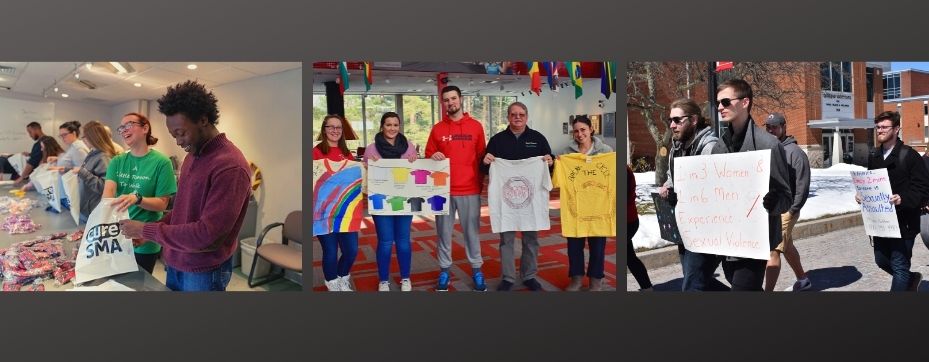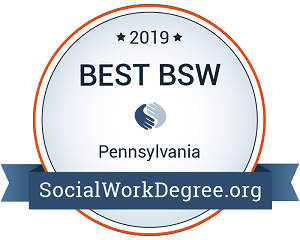
School of Health Sciences & Education
Social Work, Bachelor of Science
Introduction
Earn an Impactful Social Work Degree from Saint Francis University
Majoring in social work means striving for social justice, fighting poverty, championing others on a journey toward healing, and living a life in service to a greater cause. The fully accredited social work program at Saint Francis University can provide the foundation that you need to transform your passion into a social service degree – and a meaningful career.
Offered: On-Campus
Accredited by the Council of Social Work Education.
More than 90% of our graduates meet advanced standing criteria for masters programs (allowing them to complete their MSW in a year or less).
Named a “Best Social Work Program in Pennsylvania” by SocialWorkDegree.org

The SFU Learning Experience
Social Work the Saint Francis Way
We challenge students to engage and intervene with the larger community and political concerns that can cause or alleviate human suffering among individuals, communities, and global societies. As a social work major, you can discover a career with meaning, action, diversity satisfaction and variety.
Discover your Career Path in Social Work
The careers that our graduates follow are as varied as our graduates themselves. From day one, our Social Work program is dedicated to equipping you with diverse curricular and field experiences. Plus, with an immersive 400-hour field experience during your senior year, you can discover the right path for you.
Here are some of the experiences that our students can take advantage of:
Research: Our students are routinely invited to attend national conferences, and often are able to present the research that they worked on with faculty. You may also have the opportunity to be monitors (and be paid) through our IM4Q Grant that supports research on individuals with intellectual and developmental disabilities.
Phi Alpha Honor Society: Phi Alpha is the honorary social work society at SFU. New members are inducted at our annual banquet, and you can network with current students and alumni at multiple events throughout the year.
Pennsylvania National Association of Social Workers: Many Saint Francis students are active in the Pennsylvania Chapter of the National Association of Social Workers, which serves as the leading voice of the profession in the Commonwealth to enhance the value and respect of social workers, to influence public policy and to promote social justice.

Join the Club!
The social work club is one of the most active clubs on campus!
Hosting Take Back the Night, an empowerment week for victims of domestic violence, and child abuse every spring,
holiday programs to raise funds for local families and much more.
CURRICULUM & COURSES
What You’ll Learn in the Social Work Program
Students are encouraged to understand themselves as agents of positive change in the world, committed to justice, and equipped to defend the dignity and worth of all human beings.
As a social worker major, you will:
- Study the theory and practice of social work across the full range of social work settings, including social welfare policy and services, human behavior in the social environment, social work practice, human diversity, and social justice
- Gain the benefit of practicing advocacy, psychotherapy and counseling skills within the smaller classes at Saint Francis.
- Have the opportunity to join the social work club and host Take Back the Night, an empowerment week for victims of domestic violence, rape, and child abuse every spring.
On-Campus:
| Degree Path | Description | Course Catalog | Plan of Study |
|---|---|---|---|
Social Work, B.S. | Master the knowledge base for entry into generalist social work practice at the beginning professional level |
With a degree in social work, you’ll be able to:
- Use empirically based, cutting-edge methods and approaches to enhance social work practice and policies in an ever-evolving, local-to-global social context
- Develop engagement, assessment and evaluative practice skills and use them in work with individuals, families, groups, communities, organizations and government systems in micro-to-macro settings
- Respond to expressed human needs individually and in work with systems and governments to shape associated policy
Accreditation
The Bachelor of Social Work degree is accredited by the Council on Social Work Education. The program first received accreditation in 1974. Bachelor of Social Work graduates from accredited programs are now eligible for licensing in Pennsylvania, and those with a Master of Social Work degree are licensable in all 50 states.
Accreditation
Commission on Accreditation (COA)
Department of Social Work Accreditation (DOSWA)
Baccalaureate Social Work Program Accreditation
2022 EPAS
Form AS B5.0.1(d) | Public Reporting of Assessment Outcomes
Saint Francis University BSW Program
Generalist Practice | Summary of Plan
Competency | Instrument | Instrument: Expected Level of Achievement for Instrument | Competency: Expected Level of Achievement for Competency |
Competency 1: | Instrument 1: Oral Comprehensive Exam | 4 of 5 points on each criterion |
85% |
Instrument 2: Senior Field Evaluation | 4 of 5 points on each criterion | ||
Competency 2: | Instrument 1: Oral Comprehensive Exam | 4 of 5 points on each criterion |
85% |
Instrument 2: Senior Field Evaluation | 4 of 5 points on each criterion | ||
Competency 3: Engage Anti-Racism, Diversity, Equity, and Inclusion (ADEI) in Practice | Instrument 1: Oral Comprehensive Exam | 4 of 5 points on each criterion |
85% |
Instrument 2: Senior Field Evaluation | 4 of 5 points on each criterion | ||
Competency 4: Engage in Practice-informed Research and Research-informed Practice | Instrument 1: Oral Comprehensive Exam | 4 of 5 points on each criterion |
85% |
Instrument 2: Senior Field Evaluation | 4 of 5 points on each criterion | ||
Competency 5: Engage in Policy Practice | Instrument 1: Oral Comprehensive Exam | 4 of 5 points on each criterion |
85% |
Instrument 2: Senior Field Evaluation | 4 of 5 points on each criterion | ||
Competency 6: Engage with Individuals, Families, Groups, Organizations, and Communities | Instrument 1: Oral Comprehensive Exam | 4 of 5 points on each criterion |
85% |
Instrument 2: Senior Field Evaluation | 4 of 5 points on each criterion | ||
Competency 7: Assess Individuals, Families, Groups, Organizations, and Communities | Instrument 1: Oral Comprehensive Exam | 4 of 5 points on each criterion |
85% |
Instrument 2: Senior Field Evaluation | 4 of 5 points on each criterion | ||
Competency 8: Intervene with Individuals, Families, Groups, Organizations, and Communities | Instrument 1: Oral Comprehensive Exam | 4 of 5 points on each criterion |
85% |
Instrument 2: Senior Field Evaluation | 4 of 5 points on each criterion | ||
Competency 9: Evaluate Practice with Individuals, Families, Groups, Organizations, and Communities | Instrument 1: Oral Comprehensive Exam | 4 of 5 points on each criterion |
85% |
Instrument 2: Senior Field Evaluation | 4 of 5 points on each criterion | ||
Instrument 2: Senior Field Evaluation
| 4 of 5 points on each criterion |
Generalist Practice | Summary of Outcomes
Assessment Data Collected on: 5/25
Competency | Competency: | Aggregate Actual Outcomes: All Program Options | Program Option 1 Outcomes: Oral Comprehensive Exam
n = (6) | Program Option 2 Outcomes: Senior Field Evaluation
n = (6) |
Competency 1: Demonstrate Ethical and Professional Behavior | 85% | 98.5% | 98% | 99% |
Competency 2: Advance Human Rights and Social, Racial, Economic, and Environmental Justice | 85% | 96% | 94% | 98% |
Competency 3: Engage Anti-Racism, Diversity, Equity, and Inclusion (ADEI) in Practice | 85% | 97.5% | 100% | 95% |
Competency 4: Engage in Practice-informed Research and Research-informed Practice | 85% | 95.9% | 94% | 97% |
Competency 5: Engage in Policy Practice | 85% | 94.5% | 94% | 95% |
Competency 6: Engage with Individuals, Families, Groups, Organizations, and Communities | 85% | 98% | 98% | 98% |
Competency 7: Assess Individuals, Families, Groups, Organizations, and Communities | 85% | 95% | 92% | 98% |
Competency 8: Intervene with Individuals, Families, Groups, Organizations, and Communities | 85% | 93.5% | 92% | 95% |
Competency 9: Evaluate Practice with Individuals, Families, Groups, Organizations, and Communities | 85% | 98% | 98% | 98% |
Mission
The Social Work Program at Saint Francis University is dedicated to preparing baccalaureate level students to become generalist social work professionals who embody the core values of the social work profession: which include service, social justice, the dignity and worth of the person, the importance of human relationships, integrity, competence, human rights, and scientific inquiry. The Program is grounded in the Franciscan values of compassion, humility, and respect for all creation. It is dedicated to improving the social, economic, and environmental conditions among diverse and oppressed populations at the individual, group, community, and global levels.
Program Documents

Experienced faculty who love to teach
Our social work faculty are dedicated to preparing our students with the competency, practice skills, ethics and knowledge base for entry into generalist social work practice at the beginning professional level.
Program Chair: Dr. Suzanne Black, sblack@francis.edu, 814.472.3091
Career Outlook in Social Work
100% of our graduating class was either employed or enrolled in graduate school within the first 9 months after graduation.
Our Social Work graduates have secured positions in:
- Mental Health (Case Manager, Therapist)
- Medical Social worker (Hospice, Aging Services, Hospital)
- Child Welfare (Foster Care, Adoption, Child Protective Services)
- Human Rights Initiatives (Refugee, Immigration, United Nations)
- Community Organizing, advocacy, and development

FAQs
Frequently Asked Questions About Social Work and Saint Francis University
-
There are opportunities for employment in such areas as individual, family and group treatment, community organization, child welfare, public welfare, hospital and home nursing, social services, mental health and mental retardation programs, as well as programs for the elderly, drug and alcohol programs, community action programs, primary and secondary schools, correctional facilities, early intervention, crisis intervention and many more.
-
Yes! In the social work program, we recognize that the career paths our graduates follow are as varied as they are with an immersive 400-hour field experience during your senior year, you can discover the right path for you.
There are opportunities for employment in such areas as individual, family and group treatment, community organization, child welfare, public welfare, hospital and home nursing, social services, mental health and mental retardation programs, as well as programs for the elderly, drug and alcohol programs, community action programs, primary and secondary schools, correctional facilities, early intervention, crisis intervention and many more.
Yes! In the social work program, we recognize that the career paths our graduates follow are as varied as they are with an immersive 400-hour field experience during your senior year, you can discover the right path for you.
